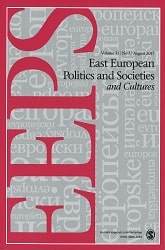Comparative Theft: Context and Choice in the Hungarian, Czech, and Russian Transformations, 1989-2000
Comparative Theft: Context and Choice in the Hungarian, Czech, and Russian Transformations, 1989-2000
Author(s): Andrew BarnesSubject(s): Economic history, Political history, Government/Political systems, Political economy, Transformation Period (1990 - 2010), Post-Communist Transformation, Corruption - Transparency - Anti-Corruption
Published by: SAGE Publications Ltd
Keywords: post-communism; privatization; financial reform; corruption; state strength; Hungary; Czech Republic; Russia;
Summary/Abstract: At the beginning of the twenty-first century, some post-communist political economies were burdened by impenetrable cross-ownership groups, money-laundering banks, and captured states, while others had effectively limited corruption and laid the groundwork for long-term development. Study of post-communist corruption, however, has been hampered by a tendency to treat it as an undifferentiated phenomenon across the region. Based onpurposively selected case studies of Hungary, the Czech Republic, and Russia, this article begins by systematically describing the political economies of those countries in a way that allows for a useful comparison. It thenar gues that the varied outcomes inthe former Soviet bloc grew out of a combination of two factors: (1) the context of state-economy relations at the end of the Communist Party era and (2) the choices made by new governments on how to control the transfer of state assets to the private sector. In making that argument, the article clarifies which legacies from the old regime, which policy choices in the new era, and which aspects of state capacity are most important in shaping post-communist transformations.
Journal: East European Politics and Societies
- Issue Year: 17/2003
- Issue No: 03
- Page Range: 533-565
- Page Count: 33
- Language: English
- Content File-PDF

